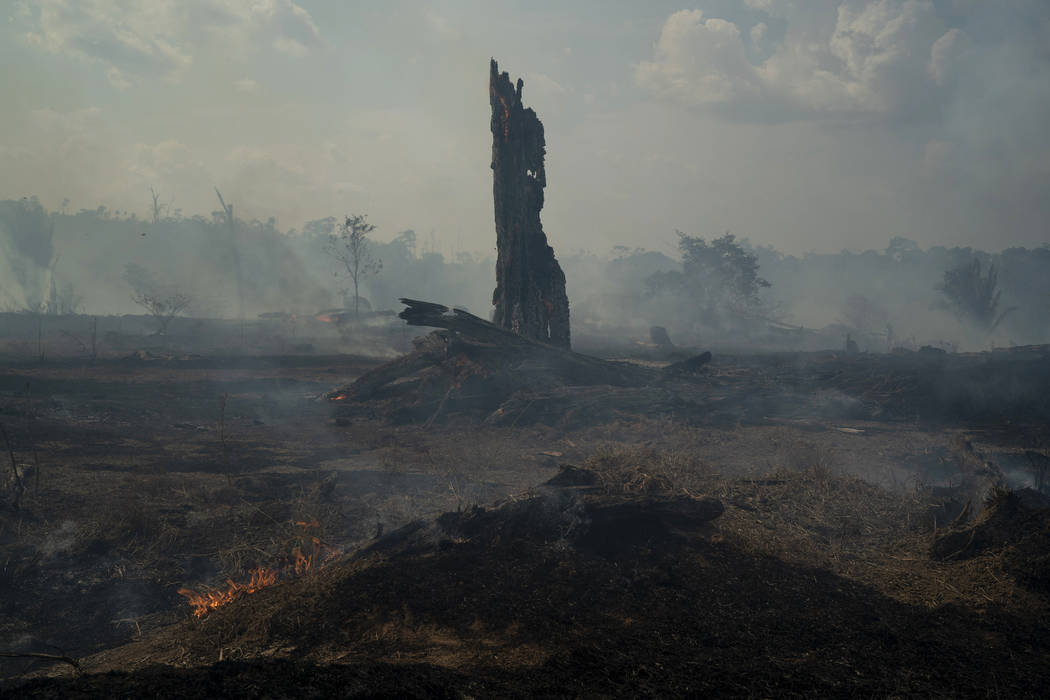Amazon fires cause rise in Brazilians’ respiratory ailments

PORTO VELHO, Brazil — Lingering smoke in the Amazon is reportedly causing increased respiratory problems — particularly among children and the elderly — as fires in the region rage.
“The kids are affected the most. They’re coughing a lot,” said Elane Diaz, a nurse in the Rondonia state capital of Porto Velho, as she waited for a doctor’s appointment Tuesday at the city’s 9 of July hospital with her 5-year-old son Eduardo. “They have problems breathing. I’m concerned because it affects their health.”
The number of people treated for respiratory issues increased sharply in recent days at the local Cosme e Damia Children’s hospital.
“This period has been very tough. The dry weather and the smoke causes many problems for children, such as pneumonia, coughing and secretion,” Daniel Pires, a pediatrician and the hospital’s adjunct director told the Folha de S. Paulo newspaper.
He said the number of cases has more than doubled since the early part of the month.
77K fires documented
Fears over health impacts have been growing with the surge in fires, with more than 77,000 blazes documented by the country’s National Space Research Institute since the start of the year. About half of the fires occurred in the Amazon region, with most in the past month.
But the issue has been overshadowed by growing acrimony between Brazil and European countries seeking to help fight Amazon fires in a region seen as vital to the health of the planet.
At a summit in France this week, Group of Seven nations pledged $20 million for the effort, with a separate $12 million from Britain and $11 million from Canada.
Bolsonaro’s view
But Brazilian President Jair Bolsonaro, a climate skeptic who took office this year with a promise to boost development in Latin America’s biggest economy, has suggested the offers of international aid mask a plot to exploit the Amazon’s resources and weaken Brazilian growth.
He raised those complaints again on Wednesday in a meeting with Chilean President Sebastián Piñera, accusing French President Emmanuel Macron — with whom he’s been feuding openly — of trying to “buy” the sovereignty of Brazil.
In a video message, Brazilian novelist Paulo Coelho offered an apology to France for what he called Bolsonaro’s “hysteria,” saying the Brazilian government had resorted to insults to dodge responsibility for the Amazon fires.
But many in Brazil said they support Bolsonaro despite local and international criticism of his handling of the crisis.
Grace Quale, a hospital laboratory technician who attended a service at an evangelical church on Sunday, said that critics “want to overthrow our president,” and said she didn’t see a link between Bolsonaro’s environmental policies and the number of people getting treatment for respiratory problems.
Mona Lisa Pereira, an agronomist, also said criticism of Brazil’s government was skewed.
“It seems like this is the fire of a lifetime,” Pereira said. “But it’s not. We have fires every year.”
Drought has not hit yet
The Amazon has experienced an increased rate of fires during drought periods in the last 20 years, but this year is “unusual” because drought has not yet hit, said Laura Schneider of Rutgers University-New Brunswick.
Schneider, an associate professor in the geography department, said fire is commonly used by people to clear land for cultivation, and the actual area burned this year must be measured for an accurate comparison with damage in past years — though that data is not yet available.
The world’s largest rainforest is a major absorber of carbon dioxide, considered a critical defense against rising temperatures and other disruptions caused by climate change, and it produces a vast amount of water vapor that affects regional weather patterns.
The state hymn of Rondonia takes pride in the region’s famously beautiful skies. “Blue, our sky is always blue,” it says. “May God keep it unrivaled, crystal, pure, and always keep it that way.”
Some clouds and a blue sky were partly visible Wednesday. But then the haze settled again blanketing the horizon with thick smoke that covered the early morning red-blood sun.
Pereira, the agronomist, said that smoke was “everywhere.”
“It’s bad for everyone,” she said. “Not just our children.”